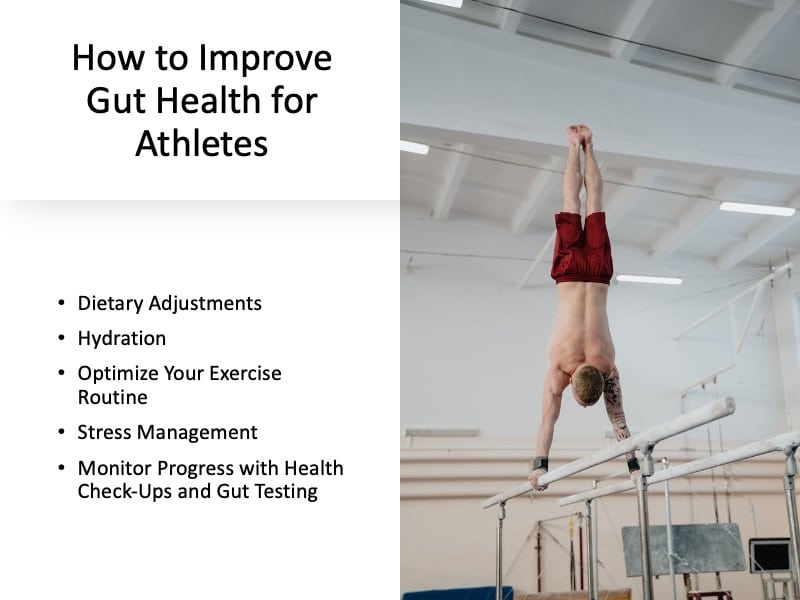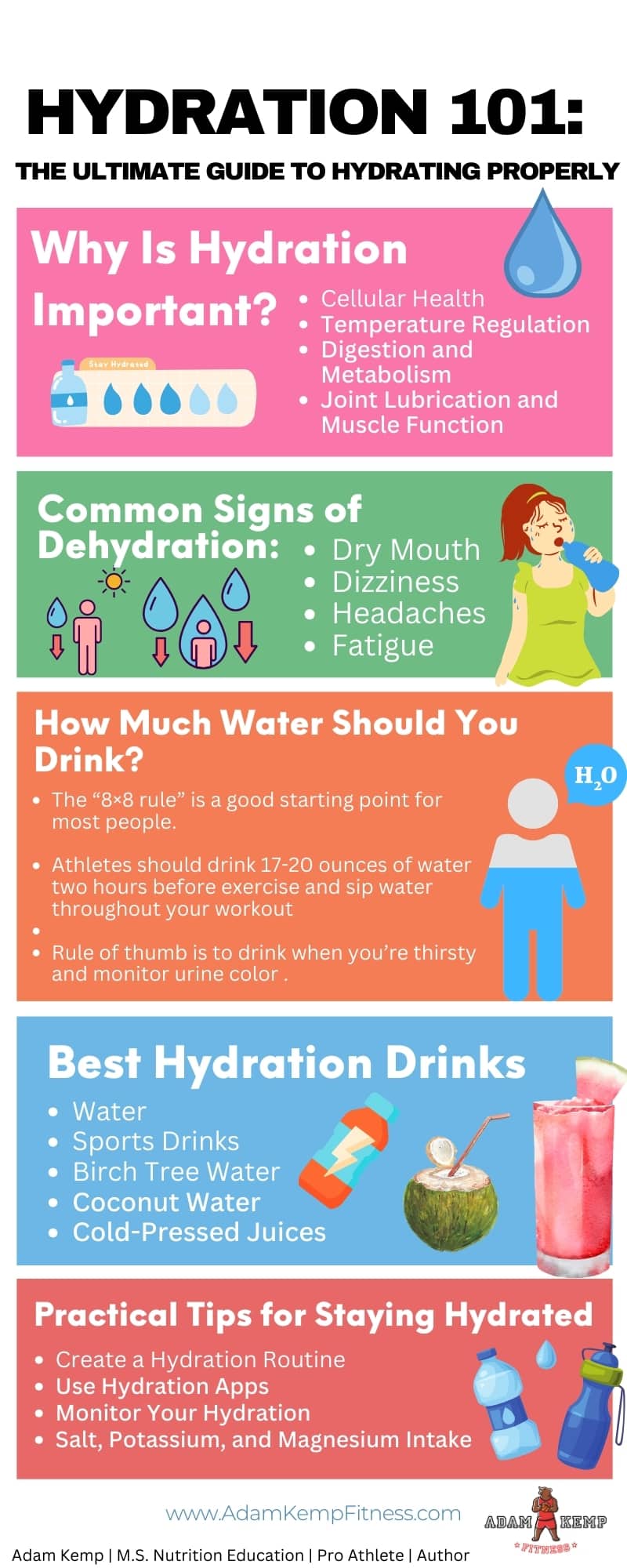Gut Health for Athletes: How to Support the Athlete’s Gut
The growing field of sports science has begun to highlight the critical importance of gut health for athletes, revealing its far-reaching impact on performance, recovery, and overall well-being.
The gut microbiome—a vast ecosystem of trillions of microorganisms residing in the gastrointestinal tract—extends its influence well beyond digestion. It plays a pivotal role in nutrient metabolism, immune system regulation, and even mental resilience (Clark & Mach, 2016).
For athletes constantly pushing their physical and mental limits, maintaining a balanced and diverse gut microbiome is essential.
For athletes, gut health directly affects energy production, inflammation control, recovery speed, and the body’s ability to adapt to training stress.
Efficient nutrient absorption, optimal immune function, and reduced gastrointestinal issues all depend on a well-regulated gut environment.
These factors not only help athletes perform at their peak but also reduce the risk of setbacks from illness or injury.
Understanding and optimizing gut health for athletes isn’t just about gut comfort—it’s a foundational pillar of high-level training and long-term athletic success.
For a more thorough explanation of the role of gut health for athletes, I highly suggest the book Peak by Dr. Marc Bubbs – one of the leading sports doctors in the world. His book covers numerous topics related to improving athletic performance, including gut health for athletes.
Last update on 2025-04-15 / This article includes affiliate links/Images via Amazon Product Advertising API. I may earn commissions on purchases made through these links.
How Does Gut Health Impact Athletic Performance?

The gut microbiome acts as a hidden performance enhancer, working behind the scenes to support energy metabolism, immune health, recovery, and more.
For athletes pushing their physical and mental limits, even minor improvements in these areas can translate to meaningful gains in performance and resilience.
Here’s how a balanced, thriving gut microbiome can become an athlete’s greatest ally:
Optimized Metabolism
Recent research suggests that a healthy gut enhances overall metabolic efficiency by regulating oxidative stress and improving mitochondrial function.
This translates to better energy expenditure during endurance efforts and a reduced burden of metabolic waste during recovery (Karl et al., 2018).
A well-adapted microbiome helps the body stay efficient, even under the stress of high-level training.
Nutrient Absorption
One of its most important impacts of gut health for athletes includes enhancing the absorption and metabolism of nutrients, which is particularly vital for athletes needing rapid and efficient energy conversion (Scheiman et al., 2019).
A healthy gut supports the breakdown and absorption of macronutrients like carbohydrates, proteins, and fats, allowing athletes to extract and utilize more energy from the food they eat.
This process is especially critical during high-intensity training or competition, where energy demands skyrocket (Jäger et al., 2019).
Efficient nutrient absorption also accelerates muscle repair and helps reduce post-exercise fatigue.
This efficient energy utilization is not only critical during physical exertion but also plays a significant role in recovery and muscle repair processes post-exercise.
Regulating Inflammation Responses
The gut microbiome plays a pivotal role in regulating the body’s inflammatory responses.
Inflammation is a double-edged sword in sports: necessary for growth but dangerous when unchecked.
The gut microbiome plays a crucial role in modulating inflammation through the release of SCFAs and by influencing the immune system’s inflammatory pathways.
Controlling chronic inflammation helps prevent injury and facilitates faster recovery.
However, an imbalanced gut microbiota, known as dysbiosis, can lead to excessive or prolonged inflammation, hindering recovery and increasing the risk of injury.
These issues are often exacerbated by physical stress and can lead to decreased performance and disruptions in training.
Immune Function
Roughly 70% of the immune system is located in the gut. A diverse gut microbiota helps train immune cells and produces antimicrobial compounds that keep pathogens in check.
This immune support is essential for athletes, who are often more susceptible to illness due to physical stress and travel demands.
A stronger immune system means fewer missed practices and more consistent progress (Lazar et al., 2018).
Mental Health
Furthermore, the gut microbiota is linked to the mental well-being of athletes.
The gut-brain axis, a bidirectional communication pathway between the gut and the brain, plays a significant role in mental health, stress response, and cognitive functions.
A healthy gut microbiome can positively influence mood and stress resilience, which are critical for mental toughness in sports (Foster & McVey Neufeld, 2013).
Muscle Health and Recovery
Beneficial gut bacteria ferment dietary fibers into short-chain fatty acids (SCFAs), such as butyrate and propionate, which reduce systemic inflammation and support muscle repair.
SCFAs also enhance glucose metabolism, boosting endurance and reducing delayed-onset muscle soreness (DOMS) after tough training sessions.
Reduced Gastrointestinal Issues
Athletes frequently deal with bloating, cramping, and diarrhea during intense exercise—especially endurance events.
These issues are often linked to gut imbalances and increased intestinal permeability.
A balanced microbiome helps reinforce the intestinal barrier, reducing the risk of gastrointestinal distress during performance (de Oliveira et al., 2014).
Improved Endurance
Certain gut bacteria synthesize B vitamins and vitamin K, which support energy metabolism, red blood cell production, and muscle function—all key factors in sustaining long-term performance.
Enhanced vitamin production can give athletes a subtle but important edge in both training capacity and recovery.
How to Improve Gut Health for Athletes

By following these steps, athletes can effectively enhance their gut health, leading to improved performance, quicker recovery, and overall better health.
Dietary Adjustments
Improving gut health for athletes starts with what’s on your plate. While adding more probiotics and prebiotics is essential for feeding and balancing your gut microbiome, it’s only part of the equation.
Several strategic dietary changes—like increasing fiber diversity, reducing ultra-processed foods, and choosing anti-inflammatory ingredients—can work synergistically to improve gut health.
Whether you’re fine-tuning your recovery, digestion, or overall resilience, targeted nutrition is one of the most effective tools you have.
Prebiotics

Prebiotics, primarily found in certain high-fiber foods, act as fuel for beneficial gut bacteria.
Common sources of prebiotics include garlic, onions, bananas, oats, apples, asparagus, and Jerusalem artichokes.
They are indigestible fibers that ferment in the gut, promoting the growth of healthy bacteria (Slavin, 2013).
Probiotics

Probiotics, on the other hand, are live microorganisms that, when ingested in adequate amounts, provide health benefits.
They are found in fermented foods like yogurt, kefir, sauerkraut, kimchi, miso, and kombucha.
The Role of Supplements for Gut Health
Supplements can play a significant role in an athlete’s gut health, especially when dietary sources are insufficient or impractical.
Probiotic supplements come in various forms, including capsules, powders, and liquids.
They typically contain specific strains of bacteria known for health benefits, such as Lactobacillus and Bifidobacterium.
Likewise, prebiotic supplements, often sourced from inulin or other fermentable fibers, can be beneficial in cases where dietary intake is limited.
Regardless, it’s important for athletes to choose high-quality supplements that have been tested for efficacy and safety.
Probiotics and Prebiotic Supplements
BIOHM Super Greens with Probiotics and Bloom Greens & Superfoods are two of my favorite supplements for gut health for athletes because they combine the essential components needed to support a strong and balanced gut: probiotics, prebiotics, and digestive enzymes.
Both products provide live probiotic strains that help populate the gut with beneficial bacteria, prebiotic fibers that feed those microbes, and digestive enzymes to aid in the breakdown and absorption of nutrients.
This trio works synergistically to reduce bloating, cramping, and other gastrointestinal issues that can disrupt performance and recovery.
What makes BIOHM stand out is its clinical formulation—it uses multiple probiotic strains, including Saccharomyces boulardii, which is known to strengthen the gut barrier, plus a wide variety of greens, detoxifying superfoods, and adaptogens for total body support.
Last update on 2025-04-15 / This article includes affiliate links/Images via Amazon Product Advertising API. I may earn commissions on purchases made through these links.
Bloom Greens offers a simpler profile, but it still includes powerful gut-supportive ingredients like spirulina, chlorella, and wheatgrass, alongside probiotics and enzymes that make digestion smoother and more efficient—something every athlete can appreciate.
Last update on 2025-04-15 / This article includes affiliate links/Images via Amazon Product Advertising API. I may earn commissions on purchases made through these links.
Both supplements make it easy to prioritize gut health without complicating your daily routine—especially helpful for athletes managing high training loads or travel schedules.
Colostrum
Bovine colostrum is the nutrient-rich “first milk” produced after birth, and it’s packed with immunoglobulins (IgG), lactoferrin, and growth factors that support gut integrity and immune function.
For athletes, colostrum supplements have been shown to reduce gut permeability (“leaky gut”), which is often triggered by intense training, particularly in endurance sports.
Force Factor Colostrum is a well-formulated option, designed to help strengthen the gut barrier, decrease inflammation, and support the immune defenses that are closely tied to gut health.
It’s especially beneficial for athletes prone to gastrointestinal distress or frequent illness during training blocks.
Last update on 2025-04-15 / This article includes affiliate links/Images via Amazon Product Advertising API. I may earn commissions on purchases made through these links.
L-Glutamine
L-glutamine is a conditionally essential amino acid that fuels intestinal cells and plays a major role in maintaining gut barrier function.
During periods of intense physical stress, glutamine levels can be depleted—making supplementation especially helpful for athletes.
Nutricost L-Glutamine provides a pure, no-frills source of this amino acid. Supplementing with glutamine can help repair the gut lining, reduce gut inflammation, and improve nutrient absorption—especially when combined with a gut-friendly diet.
Last update on 2025-04-15 / This article includes affiliate links/Images via Amazon Product Advertising API. I may earn commissions on purchases made through these links.
Collagen Peptides
Collagen is rich in glycine, proline, and hydroxyproline—amino acids that help strengthen connective tissues and support the structural integrity of the gut lining.
Type I and III collagens, like those found in Vital Proteins Collagen Peptides, are particularly beneficial for restoring gut lining resilience and aiding in tissue repair.
For athletes, this means better digestive function, enhanced recovery from exercise, and fewer inflammatory responses related to gut permeability.
Collagen supplements can also improve joint health and skin elasticity, adding more full-body benefits beyond digestion.
Last update on 2025-04-15 / This article includes affiliate links/Images via Amazon Product Advertising API. I may earn commissions on purchases made through these links.
Balancing Diet and Supplements
For athletes, the choice of prebiotic and probiotic sources should consider the intensity and nature of their training.
Intense physical exercise can sometimes lead to gastrointestinal distress; hence, it’s crucial to choose supplements and food sources that are well-tolerated and don’t exacerbate any gut discomfort.
Moreover, the timing of consumption can be crucial.
For instance, taking probiotics during or after a meal can aid in their survival through the acidic environment of the stomach.
While supplements are beneficial, they should complement a diet naturally rich in prebiotics and probiotics rather than replace it.
Athletes should aim for a well-balanced diet, as different probiotics and prebiotics provide different health benefits.
Variety in diet ensures a broader range of nutrients and beneficial compounds, contributing to a more resilient and diverse gut microbiome.
Hydration
Hydration plays a fundamental role in maintaining gut health, particularly for athletes.
Water is essential for various digestive processes, including the breakdown of food and the absorption of nutrients.
It aids in the smooth passage of food through the gastrointestinal tract, preventing constipation and promoting regular bowel movements.
For example, many protein shakes and meal replacement powders cause constipation, and they are commonly used by athletes. If you remain adequately hydrated, you can reduce the risk of developing constipation.
Additionally, adequate hydration helps dissolve fats and soluble fiber, aiding in their digestion and absorption (Popkin et al., 2010).
Lastly, the intestinal mucosal lining, a critical barrier between the contents of the gut and the rest of the body, relies heavily on proper hydration.
Water is vital for the production of mucus in the intestines, which protects and lubricates the intestinal walls.
This mucosal barrier plays a key role in preventing the entry of harmful pathogens and toxins into the body, thereby supporting a healthy immune response and reducing inflammation.
Hydration Needs for Athletes

There are many specific hydration tips for athletes, especially those involved in endurance sports because they have unique hydration requirements.
During intense exercise, the body loses fluids and electrolytes through sweat.
Replenishing these lost fluids is crucial for maintaining gut health and overall physiological function.
Dehydration can lead to reduced blood flow to the intestines, potentially causing gastrointestinal distress and negatively impacting performance.
While water is essential, athletes also need to maintain their electrolyte balance.
Electrolytes, including sodium, potassium, and magnesium, play a crucial role in various bodily functions, including nerve signaling and muscle contraction.
Drinks that contain electrolytes, such as sports drinks, can be beneficial during prolonged periods of intense exercise.
However, it’s important to choose hydration drinks with appropriate electrolyte content and avoid those with excessive sugars, like traditional Gatorade or Powerade, which can potentially cause gastrointestinal issues.
Instead, unless you are an endurance or ultra-endurance athlete who needs more carbohydrates while training, try to opt for low-calorie natural hydration drinks like:
All athletes should monitor their hydration status to ensure they are drinking enough fluids.
Signs of adequate hydration include light-colored urine and a relatively stable body weight.
Athletes should also be aware of the signs of dehydration, which include dark urine, reduced urine output, fatigue, dizziness, and dry mouth.
Drinking fluids at regular intervals, rather than waiting to feel thirsty, is key to maintaining optimal hydration.
Optimize Your Exercise Routine for Gut Health
Athletes are already active by nature, but not all training styles benefit the gut equally.
Regardless of your sport, intentionally including specific types of exercise can positively influence your gut microbiome and improve overall digestive and immune health.
How Movement Supports Gut Health
Regular physical activity enhances gut motility, helping waste move through the intestines more efficiently.
This reduces toxin buildup and promotes a more diverse and stable gut microbial community.
Exercise also increases blood flow to the digestive organs, delivering oxygen and nutrients that support gut lining integrity and microbial balance (Monda et al., 2017).
Why Gut Health Needs More Than Just Training
While most athletes train hard for their sport, gut health benefits most from moderate, consistent, and varied exercise.
Different movement patterns stimulate different gut-supportive processes.
Training solely in one style—like only lifting or only running—may not be enough to build a robust, diverse gut microbiota. Strategic variety is essential.
Three Types of Exercise to Prioritize for Gut Health
- Cardiovascular Exercise: Aerobic activities like jogging, cycling, swimming, or brisk walking stimulate gut motility and increase the production of short-chain fatty acids (SCFAs), which reduce inflammation and strengthen the gut lining. Just 30 minutes of moderate cardio a few times per week can enhance microbial diversity.
- Strength Training: Resistance training supports healthy blood sugar regulation and reduces systemic inflammation—two key components of a gut-friendly environment. Maintaining lean muscle mass also indirectly helps gut health by improving metabolic efficiency and insulin sensitivity.
- Mobility & Mind-Body Practices: Exercises such as mobility workouts, Pilates, or tai chi reduce stress and activate the parasympathetic nervous system (“rest and digest” mode), which improves digestion and supports a healthier gut-brain axis. These sessions are essential for recovery and hormonal balance.
Intensity Matters: Avoid Overtraining
Although high-intensity training is often necessary for performance gains, excessive volume without recovery can disrupt gut integrity.
Overtraining has been linked to increased intestinal permeability (“leaky gut”), heightened inflammation, and gut dysbiosis.
Adequate rest days, sleep, and stress management are non-negotiables for protecting gut health.
Personalize Based on Your Gut Feedback
Just like nutrition, your exercise plan should be adjusted based on how your body and digestion respond.
Pay attention to signs like bloating, irregular bowel movements, or fatigue after workouts.
These signals can reveal how your gut microbiota is adapting to your training volume and intensity.
Whether you’re a basketball player, runner, weightlifter, or hybrid athlete, building a gut-supportive training routine isn’t about doing less—it’s about moving smarter.
Adding intentional cardio, resistance work, and recovery-focused movement to your regimen is one of the most effective ways to protect and enhance gut health for athletes.
Stress Management for Optimal Gut Health
Chronic stress has a profound impact on the gut microbiome.
It can disrupt the balance of gut bacteria, leading to dysbiosis, which is an imbalance in the microbial community.
This disruption can affect digestive processes, immune function, and even the body’s inflammatory responses.
Stress-induced changes in the gut microbiome can also impact the gut-brain axis, potentially leading to mood fluctuations and affecting mental health, which is crucial for athletic performance.
Relaxation Techniques
Practicing daily relaxation techniques like mindfulness and meditation are effective tools for managing stress and its effects on gut health.
These practices can help lower stress hormones like cortisol, which, when elevated, can negatively impact gut health.
Mindfulness involves staying present and fully engaging with the current moment without judgment.
Meditation, which often incorporates mindfulness, can vary from guided imagery to breathing exercises. Regular practice can help athletes develop resilience against stress, benefiting their overall health and gut microbiome.
In addition to mindfulness and meditation, other relaxation techniques can be beneficial.
Techniques like daily prayer, deep breathing exercises, progressive muscle relaxation, and biofeedback can help athletes manage stress levels.
Engaging in hobbies or activities that promote relaxation, such as reading, painting, or spending time in nature, can also be beneficial for mental health and, consequently, gut health.
Adequate Sleep and Gut Health
Sleep plays a critical role in maintaining gut health.
Poor sleep quality or insufficient sleep can disrupt the gut microbiome and exacerbate stress responses.
Athletes should prioritize getting enough restful sleep, which helps regulate the body’s natural rhythms and supports the health of the gut microbiota.
Establishing a consistent sleep routine, creating a conducive sleep environment, and avoiding stimulants before bedtime can greatly improve sleep quality.

One of the most effective natural sleep aids to promote restful sleep and support muscle recovery is magnesium.
Magnesium is a key mineral involved in hundreds of biological processes, including muscle relaxation, nerve signaling, and the regulation of melatonin—your body’s primary sleep hormone.
Magnesium supplements have been shown to improve sleep quality, especially in individuals who struggle with insomnia or have high physical stress (Abbasi et al., 2012).
It also helps calm the nervous system, which can reduce nighttime wake-ups and improve deep, restorative sleep.
Magnesium glycinate is particularly beneficial for athletes.
It’s gentle on the stomach, easily absorbed, and known for its calming effects on both the muscles and the mind—making it a perfect complement to nighttime recovery.
Magnesium Threonate is another excellent option, but it it is generally much more expensive.
My go-to is Qunol Magnesium Glycinate (420mg). I’ve found it helps me wind down after a long day of training and supports consistent, quality sleep—both of which are essential for maintaining gut health for athletes.
Last update on 2025-04-15 / This article includes affiliate links/Images via Amazon Product Advertising API. I may earn commissions on purchases made through these links.
By prioritizing high-quality sleep and supporting your body with key nutrients like magnesium, you create the ideal internal environment for gut repair, muscle growth, and full-body recovery.
Regular Mental Health Check-Ins
Athletes should incorporate regular mental health check-ins into their training regimen.
Working with a mental health professional, such as a sports psychologist or counselor, can provide support in managing stress, anxiety, and other emotional challenges.
These professionals can offer strategies and tools tailored to the athlete’s individual needs, helping them maintain not only their mental and emotional well-being but also their gut health.
Balancing Training with Recovery
Part of stress management for athletes involves balancing intense training with adequate recovery.
Overtraining can lead to physical and mental stress, impacting gut health. Incorporating rest days, engaging in active recovery, and listening to the body’s signals are essential strategies to prevent overtraining and manage stress effectively.
By implementing these stress management techniques, athletes can help preserve the balance and health of their gut microbiome, which is integral to their overall health and performance.
This holistic approach to training acknowledges the intricate connection between the mind, body, and gut, underscoring the importance of mental health in athletic success.
Monitor Progress with Health Check-Ups and Gut Testing
Athletes should routinely monitor their health with regular check-ups and gut microbiota assessments.
These help catch hidden issues—like nutrient deficiencies, hormonal imbalances, or overtraining—before they impact performance.
They also provide a snapshot of cardiovascular, musculoskeletal, and overall system function.
Advanced gut microbiome testing, like the Viome Gut Intelligence Test, offers a deeper layer of insight. By analyzing microbial activity, it reveals how your gut bacteria influence digestion, inflammation, energy levels, and immune health—all essential for sustained performance.
Test results can highlight imbalances, low bacterial diversity, or specific deficiencies. From there, a sports nutritionist or healthcare provider can recommend targeted changes in diet, probiotics, or lifestyle to support gut health and recovery.
Viome even provides customized food lists and supplement formulas tailored to your gut’s current needs.
Last update on 2025-04-15 / This article includes affiliate links/Images via Amazon Product Advertising API. I may earn commissions on purchases made through these links.
As your body changes throughout training seasons, periodically retesting your gut health can guide necessary updates to your nutrition and recovery plan, ensuring that your strategy stays aligned with your evolving goals.
Staying on top of gut health through consistent tracking is one of the most practical ways to protect your performance, resilience, and long-term wellness.
Final Thoughts: Why is Gut Health Important for Athletes?
Gut health for athletes is more than just a wellness trend—it’s a foundational aspect of performance, recovery, and long-term resilience.
The gut microbiome influences everything from nutrient absorption and energy metabolism to immune defense and mental focus, making it a key player in an athlete’s overall training strategy.
Incorporating habits that improve gut health—such as eating a diverse, fiber-rich diet, staying hydrated, managing stress, supplementing wisely, and maintaining a balanced training routine—can significantly elevate how the body performs and recovers under stress.
The connection between the brain and the gut further reinforces how mental clarity and stress control impact physical readiness.
When athletes prioritize both the mental and physical dimensions of gut health, they create an internal environment primed for high performance.
Modern tools like microbiome testing offer personalized insights that make it easier than ever to fine-tune nutrition and recovery strategies.
By regularly tracking and adjusting based on individual needs, athletes can stay ahead of gut-related issues and unlock consistent progress.
In a world where small improvements matter, focusing on gut health for athletes is a powerful way to gain a competitive edge.
When the gut thrives, the body and mind follow—helping athletes perform better, recover faster, and live healthier.
For a deeper analysis into the science of gut health for athletes, I highly recommend Peak by Dr. Marc Bubbs—one of the world’s leading experts in sports medicine.
The book explores a wide range of evidence-based strategies to improve athletic performance, with gut health as a core focus.
Last update on 2025-04-15 / This article includes affiliate links/Images via Amazon Product Advertising API. I may earn commissions on purchases made through these links.











